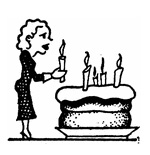
Two Dubious Anniversaries
C.S. LEWIS & T.S. ELIOT ON CONTRACEPTION
This year offers a fitting opportunity to look back at two pivotal events in the life of the broader Christian community and in the moral and social life of the United States. Eighty years ago, and forty-five years ago this summer, respectively, were dates that changed the course of human history. A bit of background: In 1908 the world’s Anglican bishops, meeting at their periodic Lambeth Conference, enacted a resolution that expressed “alarm” at the “growing practice of the artificial restriction of the family, and earnestly call[ed] upon all Christian people to discountenance the use of all artificial means of restriction as demoralising to character and hostile to national welfare.” Twelve years later, in 1920, the Anglican Communion again affirmed consistent Christian teaching by “utter[ing] an emphatic warning against the use of unnatural means for the avoidance of conception.” Yet, a mere ten years after that, in 1930, the Anglican bishops gathered again at Lambeth Palace and there, by a majority of 193 to 67, approved Resolution 15, which read, in part:
Where there is clearly felt moral obligation to limit or avoid parenthood, the method must be decided on Christian principles. The primary and obvious method is complete abstinence from intercourse (as far as may be necessary) in a life of discipline and self-control lived in the power of the Holy Spirit. Nevertheless in those cases where there is such a clearly felt moral obligation to limit or avoid parenthood, and where there is a morally sound reason for avoiding complete abstinence, the Conference agrees that other methods may be used.
Then, in 1965, thirty-five years after that fateful Lambeth Conference, the U.S. Supreme Court, in Griswold v. Connecticut, struck down as unconstitutional the last remaining state laws prohibiting the use of contraceptives by married couples, finding for the first time a “right to privacy” located in “penumbras, formed by emanations from [the] guarantees” contained in the Bill of Rights. Griswold and its “right to privacy” has been relied upon repeatedly to strike down, among other laws, statutes restricting access to contraceptives by unmarried adults (Eisenstadt v. Baird) and unmarried minors (Carey v. Population Services), and statutes criminalizing abortion (Roe v. Wade) and sodomy (Lawrence v. Texas). It has also been relied upon by state courts, which have recognized a right of members of the same sex to “marry” (e.g., Goodridge v. Dept. of Public Health).
These twin anniversaries — 1930 and 1965 — offer an appropriate opportunity to consider the misgivings of two prominent Anglicans with regard to the use of contraceptives and with the actions taken by the Anglican bishops gathered at Lambeth Palace eighty summers ago. While neither Anglican writer was willing to condemn the use of contraceptives explicitly, both recognized that serious moral issues were at stake. As we live today in a world ravaged by the tragic consequences of these two pivotal events, we would do well to ponder their words.
You May Also Enjoy
Christians are called by Finnis, Boyle, and Grisez to avoid any cooperation with our nuclear deterrent, just as we must avoid any cooperation with the abortion industry.
Gov. Ronald Reagan signed a milestone pro-abortion bill in 1968. California's abortions jumped from 518 in 1967 to an average of 100,000 per year from 1968 to 1974.
Arthur Schlesinger said the most "tenacious tradition of paranoic agitation in American history has been anti-Catholicism." This book is a product of it.

